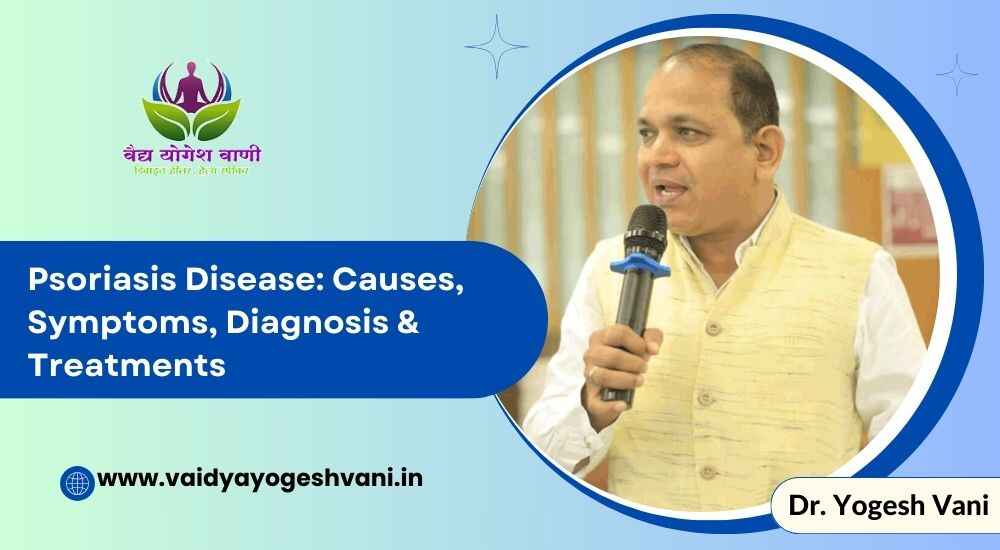Psoriasis is one of the chronic diseases that take refuge in the skin of millions. Myths and misunderstandings surrounding this condition are huge, especially relating to Ayurvedic treatment. The misconceptions dominating a vast majority of them are clarified with evidence-based insights into the relationship between psoriasis and Ayurveda in the blog.
What is Psoriasis: A Brief Overview
An autoimmune disease characterized by the rapid growth of the skin cells, which then causes scale-forming, thick, red, scaly patches on a person’s skin is usually quite itchy and can even pose a quite handicap. Under the circumstances, learning the basics can very well be essential, breaking all the myths and misinformation about the disease to bring more accurate information to better manage the condition.
Myths About Psoriasis and Ayurveda
Ayurveda Can Cure Psoriasis Completely
The biggest misconception is that Ayurveda will cure psoriasis totally, if not even completely. Ayurvedic treatments could certainly control symptoms and improve skin health, but a complete cure and even total removal of the disease cannot be claimed. The greatest objection to Ayurveda is in balancing one’s energies for general well-being and this can greatly reduce symptoms but by no means necessarily ensure a permanent cure.
Ayurvedic Treatments Are Not Scientific
Another myth arises from the notion that Ayurvedic treatments lack scientific evidence. On the contrary, most procedures in Ayurveda are formulated based on decades of observation and put into clinical investigation. Although much research needs to be done in this area, some herbs used in Ayurveda. Such as Turmeric and Neem, have proved successful in controlling the outbreaks of psoriasis.
All Ayurvedic Treatments Are Safe
Despite the limelight of natural ingredients, not everyone with Ayurvedic treatments for Psoriasis will be in their safest form. Certain herbal remedies can react with conventional medications or cause some allergic reactions. As such, it is always prudent on the part of individuals to seek consultation with a qualified practitioner of Ayurveda before embarking on any treatment. Particularly for those who have pre-existing conditions or are under medication.

Misunderstandings Regarding Psoriasis and Ayurveda
- Psoriasis is Just a Skin Disease: While for most people, psoriasis is just a skin condition, it is basically an autoimmune condition that may also affect various parts of the body. Thus, people who are not aware of this easily adopt improper treatment strategies. Ayurveda handles psoriasis with its holistic approach to physical and mental health, thus completely being helpful.
- Diet Has No Impact on Psoriasis: It is considered to be a fact that diet does not play a role in psoriasis, while many patients declare that certain food items provoke symptoms or aggravate them; Ayurveda emphasizes the smooth diet rich in anti-inflammatory foods, which possibly might control the condition effectively.
- Only Severe Cases of Psoriasis Require Treatment: Another common myth is that only serious cases of psoriasis should be treated. The truth is that even the mildest form of psoriasis impacts the quality of life of that individual. Psoriasis needs to be addressed at its earlier stages, and treatment, including Ayurvedic drugs, should not be taken lightly.
Misbeliefs About Psoriasis Treatments in Ayurveda
Ayurvedic Treatments Are Just Herbal Remedies
The use of herbs plays a big role in Ayurveda, but such treatment also generally encompasses dietetics, lifestyle, and even medicinal therapy in the form of Panchakarma detoxification. Mistaking Ayurveda as merely herbal misses its holistic potential.
Ayurveda is Only for Indians
Another myth is that Ayurveda relates to the Indian race only. The truth is that the principles of Ayurveda are truly universal and everybody can benefit from it, regardless of color or any other background. It is holistic in nature, so it can be applied in a manner best suitable for individual needs, making it relevant for various populations.
Ayurveda is a Quick Fix
Most people think Ayurvedic treatments work miracles overnight. In reality, like any holistic treatment, it takes time and commitment to the lifestyle changes and therapies. An easy outcome comes from the aspect of suffering patiently and being committed.
Psoriasis Common Myths Explained and Clarified
- You Can Outgrow Psoriasis: Some will experience symptoms that eventually decline. Again, this is only true for so many; most of the patients will have the disorder forever. Its continuous management is necessary and not that one waits for it to go away on its own.
- Psoriasis is a Cosmetic Issue: This myth denies the emotional and psychological impacts of psoriasis. People who experience psoriasis are exposed to various forms of social stigma as well as most forms of psychological pain. The acknowledgment of psoriasis as a major health issue. In this way, it can be viewed as encouraging sympathy and understanding.
- Home Remedies Are Sufficient: Most people may feel that home remedies alone can manage psoriasis. While some might help relieve the condition, they are often not a substitute for the medical advice or treatment an individual may require. One’s best results would come from combining Ayurvedic practices with conventional care.
Conclusion
This would thus help any individual in dealing with the realities of psoriasis about Ayurveda for the effective management of such a problem. So there is much to be said over myths, misconceptions, and other things surrounding the condition; but knowledge and understanding of facts empower one to seek the right treatment. Ayurveda does provide valuable insights and methods for managing psoriasis, but that is not sufficient for its treatment.
In unbanning myths about psoriasis and Ayurveda, we open doors for more informed discussions and better management strategies. So, all recognition regarding how complex psoriasis is and the potential benefits of Ayurveda can lead to much better health status and well-being outcomes in this direction.



